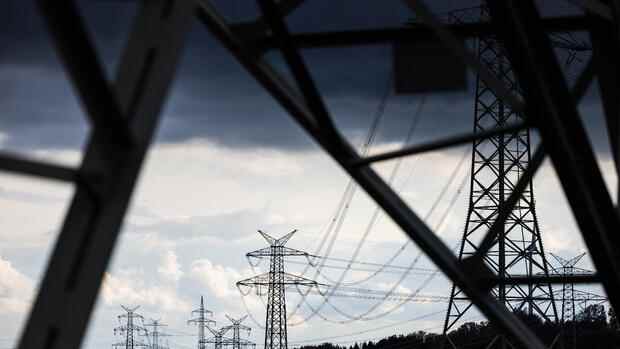Part of the electricity price goes to the transmission system operators, who transport electricity over long distances.
(Photo: dpa)
Dusseldorf The federal government has curbed a foreseeable further increase in electricity prices in Germany. It prevents the electricity grid fees from rising sharply in the coming year and thus also increasing the overall electricity price for consumers. This emerges from a statement by the four German transmission system operators.
Transmission system operators are responsible for the large power lines in Germany, which transport electricity over long distances. Depending on the region in Germany, the responsible transmission system operator is either 50 Hertz, Amprion, Tennet or TransnetBW.
For 2023, the four companies are jointly publishing nationwide transmission network fees for the first time. According to the announcement on Wednesday, the provisional average grid fees for the coming year will be 3.12 cents per kilowatt hour. Depending on the zone, a fee of between 2.94 and 3.29 cents currently applies in Germany. So the new price is only slightly above the old average. The notification states that the federal government’s third relief package will help stabilize network charges at the previous year’s level.
It costs the federal government billions. A Tennet spokeswoman told the Handelsblatt that the grid fees would have risen by 250 percent without the relief from the federal government. According to the Federal Network Agency, the transmission system operators together generated around 5.3 billion euros in income from network fees in 2022. If this sum increased by 250 percent, revenues of more than 18 billion euros would result. Income that the network operators need, for example to keep the power grid stable. In order to keep the costs for electricity consumers stable, the federal government must therefore inject around 13 billion euros.
Top jobs of the day
Find the best jobs now and
be notified by email.
The Reuters news agency reported on Wednesday afternoon, also citing people familiar with the plans, that the federal government had injected almost 13 billion euros.
Network charges of more than ten cents threatened
The billions in aid from the federal government are important for consumers and companies: Without them, the grid fees would increase to 10.7 cents per kilowatt hour and thus significantly increase the overall electricity price. According to the Federal Association of Energy and Water Industries (BDEW), the average electricity price for a typical household in July 2022 was 37.3 cents per kilowatt hour. According to BDEW, the industrial electricity price in 2021 averaged 12.48 cents per kilowatt hour. An increase in network charges from three to ten cents would therefore have a significant impact as a cost component.
Recently, the price of electricity has risen significantly anyway. Private consumers and industry groan under the high prices. In the economy, it is primarily sectors that are affected that cannot pass on the higher costs for electricity to their customers because they are in international competition.
The fact that the transmission system operators are currently incurring such high costs is partly due to imbalances in the European electricity grid. These are also caused by the failure of many French nuclear power plants. The transmission system operators have to compensate for such imbalances.
More: New price jumps threaten: Opec apparently throttles oil production

